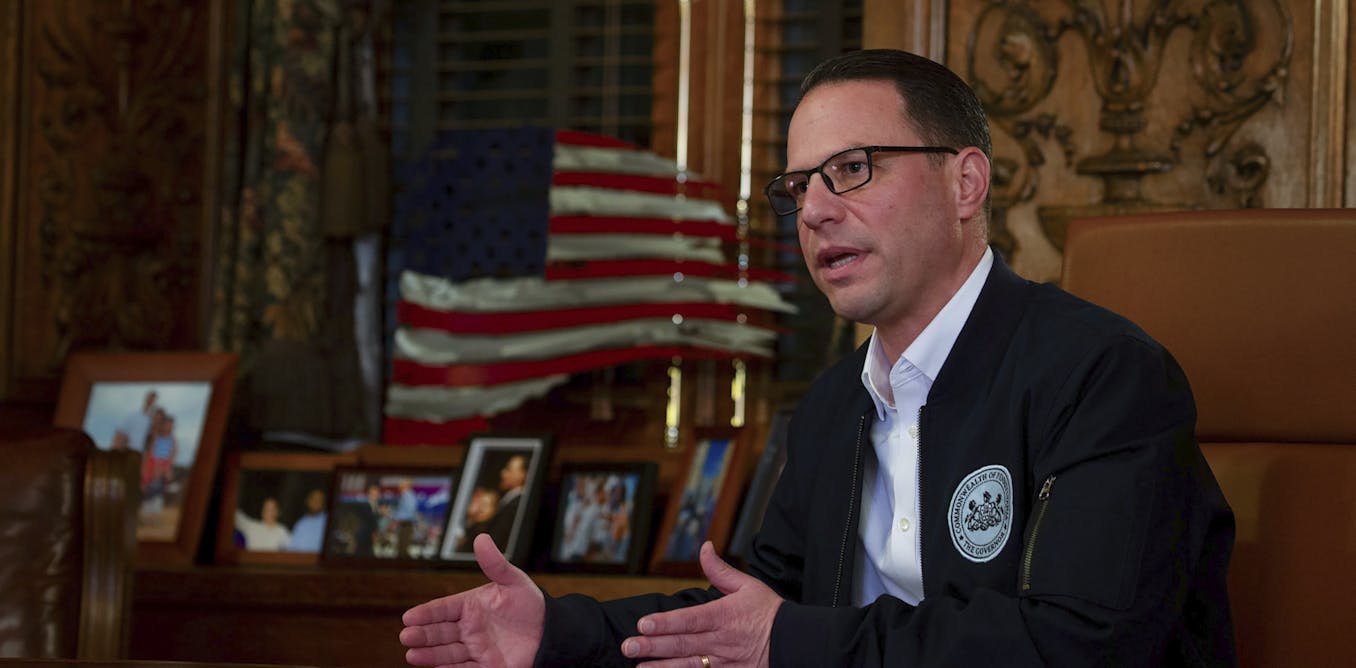Major US soft-drink and snack-food corporations are waging a coordinated campaign that aims to pit Donald Trump’s Maga faithful against Robert F Kennedy Jr’s Make America Healthy Again movement, a Guardian investigation in partnership with environmental watchdog Fieldnotes has found. Their goal is to stymie the Maha-led effort to curb Americans’ consumption of soda and ultra-processed foods.
To carry out the plan, the companies have turned to a partially formalized network of for-hire pollsters, strategists and political financiers with deep ties to the national Republican party – several of whom have taken steps that obscure their connection to the effort and to one another. In the process, the industry has also been aided less directly by a loose coalition of free-market ideologues who have previously worked to advance Trump’s deregulatory agenda.
The effort features Maga influencers hired by a firm that promotes “anti-woke” movies; an obscure research group Lee Zeldin was working for when Donald Trump picked him to lead the US Environmental Protection Agency; and a media outlet backed by rightwing billionaires Leonard Leo and Charles Koch, among others.
The ongoing influence campaign is being spearheaded by the American Beverage Association with help from the Consumer Brands Association, two prominent trade groups in the food industry. Coca-Cola, PepsiCo and Keurig Dr Pepper, the three largest soft-drink corporations in the United States, as well as packaged-food conglomerates like General Mills, Kraft Heinz, Mondelēz and Nestlé, are among those that pay dues for the right to have a say in either or both of the trade groups’ strategies.
All three soda-makers identified the Maha efforts as significant threats to their bottom lines in their most recent annual reports, delivered to investors after Trump nominated Kennedy to be secretary of US Health and Human Services. Coke and Dr Pepper went as far as to suggest such risks would be compounded if unnamed “government officials” were to voice health concerns about their products. The three soda makers did not respond to questions about the lobbying effort.
The companies’ most pressing political concerns are two related RFK Jr-backed efforts: one to ban schools from serving foods with petroleum-based dyes, and the other to bar individuals receiving Snap benefits from using the federal nutrition assistance to purchase soft drinks.
Their not-so-subtle message to conservative lawmakers, delivered directly by lobbyists and indirectly via both an industry front group and paid social media influencers: oppose the Maha efforts or face a Maga backlash.
“Working-class families and individuals across America rose up to vote for President Trump on the promise of a new era that would lift them up, not leave them behind again,” the beverage lobby declared earlier this year in an unsigned memo as some of the first Maha-themed nutrition efforts were gaining conservative support in places like Utah and Arkansas. Supporting the Snap restrictions, the group continued, “would betray those voters and that promise”.
To date, the Maha nutrition efforts have largely stalled inside the Beltway but found far more success outside of it. A dozen states have already requested, and received, waivers from the US Department of Agriculture allowing them to restrict how Snap benefits can be used, and roughly a half dozen have passed legislation restricting food dyes in school meals.
The Utah state representative Kristen Chevrier, a Republican whose Snap and school-meals bills were signed into law by her governor in March, says that’s likely because the industry’s influence is concentrated in the nation’s capital. “It’s easier for the big food industries to control the federal government then it is for them to control a whole bunch of different states,” she said in an interview.
Chevrier, who describes herself as “a Maha mom before Maha was a thing”, said the lobbyists who approached her focused far more on their own profits than any political backlash she might face. Their priority was “how much money they were going to lose if people stopped buying soda with Snap dollars”, she said. “The lobbyists were sitting there at the table with me and I said: ‘Do you have any idea what this sounds like? That you’re more concerned about the money you’re going to lose than you are about the health of the vulnerable population that you’re serving?”
Mystery firms and ‘lethal precision’
Communications obtained via a public records request confirm that industry lobbyists attempted to use the Maga-versus-Maha messaging in their bid to derail the nutrition bills at the state level. And they’ve done so with veteran GOP strategists serving as middle operatives, creating the appearance of distance between the companies and their preferred narrative.
In late February, for instance, as two Maha bills were moving through the Arizona legislature, soda lobbyist Michael Gardner reached out to lawmakers to make his client’s case against the Snap legislation, which was ultimately vetoed by the governor. He closed by directing the elected officials’ attention to a then-recent article headlined “Trump voters want SNAP users to be able to buy soda”. The underlying source for that claim was a poll paid for by the American Beverage Association itself.
The firm hired to conduct the survey, Public Opinion Strategies, is owned by Glen Bolger, who previously worked for the National Republican congressional committee, the House GOP’s main campaign arm. The American Beverage Association paid Bolger’s firm nearly $2m in 2023, the most recent year for which the trade group’s tax filings are publicly available.
Bolger and his firm are also part of a larger, formal network of political shops run by Phil Cox, who was once a top executive at Americans for Prosperity, the Koch family’s primary dark-money group, and who is currently on the board of the Senate Leadership Fund and WinRed. Cox’s network, GP3 Partners, includes more than a dozen other firms and boasts online of its “proven ability to play with lethal precision at scale”.
Completing this particular lobbying spin-cycle – from industry-funded poll to news coverage the industry’s lobbyists could use to pressure lawmakers – was the outlet in which the article about the survey appeared, the Center Square. Despite claiming to be a provider of “high-quality statehouse and statewide news”, it has been identified by journalism experts at Columbia University as a purveyor of “pink slime”, meaning, partisan talking points presented as objective journalism. The Center Square is run by the Franklin News Foundation, a conservative non-profit that has received substantial funding from Donors Trust, Leonard Leo’s primary dark-money vehicle, and that is part of the State Policy Network of rightwing thinktanks backed by Leo and the Koch family. (Chris Krug, the publisher of the Center Square, said in an email: “The Center Square maintains editorial independence, free from any external influence.”)
As Gardner was working to derail Arizona’s Snap bill on behalf of the soda makers, a second industry lobbyist, the Consumer Brands Association’s Erin Raden, was waging a similar, albeit more convoluted, effort in opposition to the state’s school-meal bill, the records show.
In a March email to one of the bill’s sponsors, Raden argued against the legislation and then, much as Gardner had, closed by pointing to an article posted by a rightwing news outlet that suggested Trump voters wanted such decisions left to the president. “I know you are hosting a town hall tomorrow and thought it might come up,” Raden wrote to the Republican senator Janae Shamp, who had introduced the bill in Arizona’s upper chamber.
This time, the underlying poll on which the article was based was conducted by the Tyson Group on behalf of Plymouth Union Public Research. Unlike Public Opinion Strategies, which is well-known within certain Washington DC circles and publicly discloses its ties to GP3, Tyson Group has a far smaller and less transparent public presence. Its website lists just five employees. However, the firm doesn’t disclose publicly that all five of those individuals also work at P2 Public Affairs, a much larger and more prominent conservative consulting firm – one that, like Public Opinion Strategies, is also part of Cox’s GP3 umbrella organization.
The metadata on an internal memo for subsequent Tyson polling likewise shows that document was created by Katherine Swetman, who is not listed on Tyson’s site as an employee but is listed on P2’s as a marketing manager specializing in “targeted messaging”. (P2 and Tyson did not respond to questions about their structure or involvement in the campaign. The Consumer Brands Association said in a statement that it did not pay for the poll but believes “most voters across the country” would prefer a national standard for food additives.)
Plymouth Union Public Research is even more opaque. The group, also known as PUP Research, describes itself online as a 501(c)6 non-profit, but there is currently no record of it in the Internal Revenue Service database of such tax-exempt organizations. The group did not respond to questions about its leadership and staff. The firm does, however, show up in the ethics paperwork Zeldin filed in January as part of his confirmation process. In that filing, Zeldin disclosed serving as a director at the research firm from October 2024 to the time he filed the report on 11 January 2025.
While PUP Research doesn’t disclose its leadership or employees, an apparent sister organization known as Plymouth Union Public Advocacy, or PUP Advocacy, does. The advocacy firm’s website suggests it launched earlier this year with a seven-figure paid campaign in support of Trump’s agenda, and that it is led by a trio of GOP veterans.
The Trump administration at times pushes back on the idea that Maha’s nutrition agenda is an affront to its base. Earlier this year, after the Arkansas governor Sarah Huckabee Sanders applied for one of the Snap waivers, the American Beverage Association labeled Sanders and the head of the USDA, Brooke Rollins, as the “food police” on X. (The American Beverage Association’s CEO, Kevin Keane, has undertaken a tour of conservative podcasts and conferences, pushing a similar line that the government shouldn’t be “making decisions for people” when it comes to nutrition.)
The post drew a swift rebuke from Rollins’s X account. “It’s disappointing that the American Beverage Association’s leadership dragged its entire membership–and the patriotic American workers and their families they employ and represent–into direct conflict with this Administration’s priorities for American health, well-being, and taxpayer protection,” she wrote. “These priorities–which those same American workers voted to endorse–will prevail.” She tagged Kennedy in her response.
Paid Maga influencers
As industry lobbyists were making their case to lawmakers directly, an industry-funded front group, Americans for Food and Beverage Choice, was running a small-dollar Facebook ad campaign featuring the industry’s Snap-related polling in at least nine states, according to the Meta ad library database. The non-profit bills itself as a grassroots organization, but according to its 2023 tax filing, the most recent available, each of the four individuals who served as either a director or officer of the organization that year also was employed at the American Beverage Association, including Keane himself.
Meanwhile, a group of Maga-aligned influencers were taking the same pro-soda message nationwide by posting client-approved talking points on Elon Musk’s X – all while not disclosing they were being paid to do so. “We cannot allow ‘Make America Healthy Again’ messaging to be used to force needy Americans into not buying certain things,” tweeted conservative influencer Eric Daugherty, adding: “President Trump literally has a Diet Coke button in his Oval Office.”
The paid-influencer campaign was first documented by Nick Sortor, a conservative journalist and podcaster, who obtained internal documents from the social media marketing agency behind the effort, Influenceable LLC.
“This campaign highlights the dangers of government overregulation, with a specific focus on current efforts to restrict soda purchases through food-aid programs,” the company’s instructions to the influencers read. “The narrative emphasizes how such regulation is an overreach that unfairly targets consumer choice, especially considering the president himself is a Diet Coke enthusiast.” For good measure, the influencers were also encouraged to share a photo of Trump drinking a soda while riding in a golf cart.
After being called out by Sortor, Daugherty and at least one other influencer deleted their posts. “Yeah, that was dumb of me,” Daugherty posted. “Massive egg on my face. In all seriousness, it won’t happen again.”
Influenceable LLC is run by Camron and Liam Rafizadeh, brothers who have made a name for themselves by trafficking in anti-LGBTQ+ memes and pro-Trump talking points online. In 2019, the pair founded Today Is America Inc, which describes itself as “the fastest-growing pro-America Gen Z, Anti-woke company”.
While Influenceable’s website does not list any specific political campaigns it has worked on, IRS filings show that it was paid $110,000 in 2023 by the Center for Renewing America, a Christian-nationalist organization founded by Russell Vought, Trump’s current director of the office of management and budget.
Keane has denied that the American Beverage Association was behind the Influenceable campaign. Nonetheless, the proposed talking points strongly echo the industry’s – including one that appears to cite the very poll the group paid for and then used to lobby state officials in Arizona and cited in the Facebook campaign run by the front group that Keane leads. “Polling shows,” the final talking point given to the influencers reads, “a majority of Trump voters oppose restrictions on soda purchases through SNAP.”
Josh Voorhees is an investigative editor at Fieldnotes, a watchdog organization focused on the oil and gas industry

 German (DE)
German (DE)  English (US)
English (US)  Spanish (ES)
Spanish (ES)  French (FR)
French (FR)  Hindi (IN)
Hindi (IN)  Italian (IT)
Italian (IT)  Russian (RU)
Russian (RU)  3 hours ago
3 hours ago
























Comments